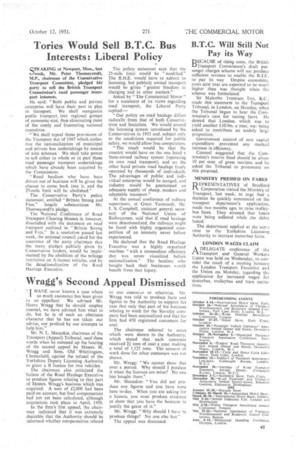Tories Would Sell B.T.C. Bus Interests: Liberal Policy
Page 35

If you've noticed an error in this article please click here to report it so we can fix it.
QPEAKING at Newport, Mon. List 1,-)w-eek, Mr. Peter ThorneyZroft, M.P.., chairman of die Conservative Transport Committee, pledged Ids' party to sell the British Transport Commission's road passenger transport interests.
He said: "Both public and private enterprise will have their part to play in transport. We Shall reorganize public transport into regional groups of economic size, thus eliminating most of the costly and frustrating national executives.
"We shall repeal those provisions of the Transport Act of 1947 which autho rize the nationalization of municipal and private bus undertakings by means of area schemes. We shall take power to sell either in whole or in part those road passenger transport undertakings which have already been acquired by the Commission.
"Road hauliers who have been driven out of business will he given the chalice to come back into it, and the 25-mile limit will be abolished."
The Conservative Party's policy statement, entitled "Britain Strong and Free," largely substantiates Mr. Thorneycroft's pledge.
The National Conference of Road Transport Clearing Houses is, however, dissatisfied with the statement on road transport outlined in "Britain Strong and Free," In. a resolution passed last week, the national council asked for the assurance of the party chairman that the many pledges publicly given by Conservative leaders, would be implemented by the abolition of the mileage restriction on A-licence vehicles, and by the denationalization of the Road Haulage Executive. The ,policy statement says that the 25-mile limit would be "modified." The R.H.E. would have to submit to licensing, but publicly owned transport would be given "greater freedom in charging and in other matters.' ' Asked by " The Commercial Motor" for a statement of its views regarding road transport, the Liberal Party replied:— " Our policy on road haulage differs radically from that of both Conservatives and Socialists. We would amend the licensing system introduced by the Conservatives in 1933 and, subject only to the conditions required for public safety, we would allow free competition.
"The result would be that the country would have on the one hand a State-owned railway system (operating its own road transport), and on the other hand private road haulage freely operated by thousands of individuals. The advantages of public and individual enterprise would be merged, and industry would be guaranteed an adequate supply of cheap, modern and adaptable transport."
At the annual conference of railway supervisors, at Great Yarmouth, Mr. J. S. Campbell, assistant general secretary of the National Union of Railwaymen, said that if road haulage were denationalized, the railways might be faced with highly organized cornpetition of an intensity never before experienced.
He declared that the Road Haulage Executive was a highly organized machine "with a tremendous efficiency that was never visualized before nationalization." The hauliers who bought back their businesses would benefit from that legacy.




















































































